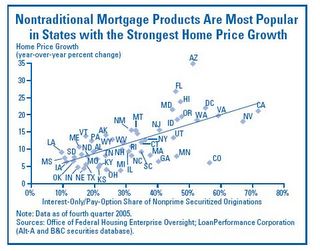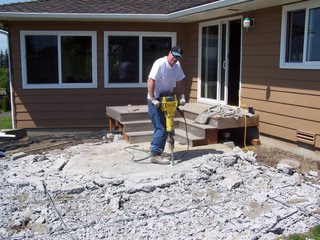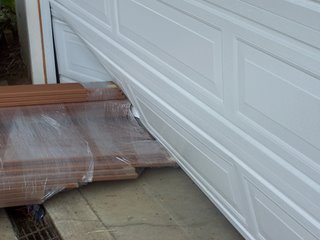Last week, Gregory Wharton posted the grand culmination of his 15-part Seattle real estate bubble extravaganza. I wanted to wait until he posted the last chapter, but it's been over a week, and I think the points he made in his most recent posts should be addressed sooner rather than later. I said in my first post about his series that "I may not agree with all of the conclusions he comes to, but at least he is giving the subject a genuinely thoughtful analysis." I stand by that statement. I appreciate Mr. Wharton's thoughtful approach, but I do of course disagree with his primary conclusion that Seattle is not currently in a bubble market. In this post I will lay out the reasons that I am not convinced by Mr. Wharton's argument. I'm not going to spend time (right now) making the case why I do believe that Seattle is in a bubble, but rather the scope of this post will be limited to refuting Mr. Wharton's argument that we are not.
This is a pretty lengthy post, so let's get right to the point. Here's Mr. Wharton's money quote (emphasis mine):
So, even though prices have been increasing, sometimes at breathtaking rates, in Seattle there have been solid economic reasons for them to have done so. That doesn't necessarily mean that prices will continue to rise at their recent rates (an issue I will address in the final chapter to come), but it also means that a bubble-deflating crash to fundamentals isn't impending. For those who have been priced out of the market, now facing still-stagnant wages and rising interest rates, that will likely be unwelcome news.
Let me stop right there. I want to take this argument one piece at a time. Clearly I agree that prices have been rapidly increasing. No argument there. Obviously prices don't go up unless there's
some reason, but are the reasons for the price increases truly "solid economic" ones? These are the four "solid economic reasons" that Mr. Wharton claims are driving Seattle real estate prices up at a "breathtaking" rate:
- The reduction of risk in real estate compared other markets
- The inherent value of improved property versus the increasing cost of new construction
- The restricted supply of permission to build versus steadily increasing demand for real estate assets
- The reduced cost of money increased the purchasing power of capital when leveraged
I'll address each one, slightly out of order.
The reduction of risk in real estate compared other markets"Reduction in risk" is a canard, and is more a
psychological reason than a "solid economic" one. Even the
title of the post where he explained that bullet point was titled
Swooping Buzzards: The Fickle Flight of Capital (emphasis mine). In it, he said:
Following the collapse of the Tech Stock Bubble beginning in early 2001, a substantial amount of investment capital fled from the equities markets and into U.S. real estate. Some of this was institutional investment funds, but by far the most important portion of it was money committed by individual investors. As the stock market fell and individual Americans felt the bite on their 401(k) plans and mutual fund statements, they began withdrawing their money and investing it first in their homes, then later in real estate generally. The perception that "home values never go down" and "you always need a roof over your head" combined with uncertainty in the equity markets to generate a flight of capital toward real estate.
So the "reduction of risk" basically comes from the fact that everyone
believes there is a reduction of risk. I fail to see how that is either "solid" or "economic."
The restricted supply of permission to build versus steadily increasing demand for real estate assetsHe claims that there is a "
restricted supply of permission to build:"
In Seattle, there are large cost premiums on real estate associated with land-use regulation. At least a quarter of the price paid for the median home in Seattle is directly associated with this cost.
I don't doubt that regulation is a primary contributing factor that makes Seattle homes more expensive than those in say, Duluth. However, what Mr. Wharton
does not explain is why this factor would contribute to the surge in prices that we have seen
since 2001-2002. Have Seattle building regulations become
more restrictive in the last 5 years?
The 2002 study he refers to throughout his post is based on data from
1999, when the median priced home sold for
less than 54% what it does today. So how can regulatory issues be a "solid economic factor" driving prices so high so fast in the last 5 years?
The reduced cost of money increased the purchasing power of capital when leveragedTranslation: low interest rates, baby! Yes, interest rates have been at historic lows, and no one I know has attempted to argue that this is not one of the primary driving forces behind the drastic price increases we have seen across much of the country, including Seattle. This reason is at least "economic," although considering that interest rates are on their way back up, I'd hardly call it "solid."
As Mr. Wharton points out, looser lending standards are also largely to blame for skyrocketing prices.
Low interest rates also encouraged lenders to come up with new ways to keep up their profit margins. The simplest way to do that was to expand the pool of people they were willing to loan money to. Another issue was that, even though the monthly payments were getting more affordable, higher prices in the housing market meant higher down payments to meet conventional equity requirements (20% of purchase price). Americans were able to buy more financing with their monthly payment amounts, but they didn't have a proportionately higher reserve of cash to cover the higher down payments. Lenders obliged by offered a wide new range of options for buyers to enter the market without having to raise a lot of cash for equity. Hard money seconds, promissory notes, home equity loans, and a wide variety of other financing methods proliferated in response.
However, for this to be used as evidence that we are
not in a bubble, it would have to be unlikely to reverse course. Interest rates are already on the rise. So far, banks are still broadening the pool of suicide loan packages, but does anyone seriously believe that trend will continue? When the financing industry inevitably begins the return to tighter lending standards, won't that drive prices down the same way the opposite trend drove them up?
The inherent value of improved property versus the increasing cost of new constructionI left this for last because I believe it is really the best thing Mr. Wharton has going to support his conclusion. Unfortunately, "the best" just isn't good enough, in my opinion. Here's
the crux of his argument:
The size of a median home in Seattle is currently 1,720 square feet. In 1999, average construction cost for market-rate homes targeted at the median range was about $110 per square foot. Right now, construction cost in the same segment is running, on average, at about $160-$170 per square foot. Some houses are built for more, some for less, but a majority are now falling into that price range.
...
Doing a quick calculation, I see that the median home of 1,720 square feet has a construction hard cost replacement value of about $284,000. Adding in 15% soft cost, the comparative value of new construction for the median Seattle home is $326,600 not including land. That is certainly less than the median home sale price of $427K, but not by so much that we should immediately think we're seeing a bubble in real estate prices.
I already addressed the fact that
I'm not convinced his construction cost figures are entirely accurate, but for the sake of this post, let's just assume that they are. I believe that even if those figures are accurate, it still doesn't mean that we aren't in a bubble—prices are still likely to go
down in the future.
The easiest way to explain my argument is by way of analogy. It's a pretty cheesy one, but I think it gets the point across nicely.
Let's say there's some portable consumer electronics device that plays digitally-stored music, costs $200 to produce, and sells for $400. Let's call it an iHip. Thanks to some great press and a word-of-mouth frenzy, the iHip is a huge success, and it is on everyone's "must have" list. Despite the fact that portable music can be had in any number of ways, iHips are
the preferred choice. Well, say that the cost to produce iHips goes up to $250, and the sales price follows suit, increasing to $450. No big deal, people still buy iHips because they're so darn hip and popular. Plus now existing iHip owners can sell their used iHips for that much more—if they wanted to get rid of their iHip, that is—which most of them don't, because it's so gosh darn cool.
Five years later, 65% of the population owns an iHip, in spite of the fact that the cost to produce iHips has shot up to $800, and they now sell retail for $1,200. One day a prominent tech writer points out that portable music can be had for a fraction of what people are spending on iHips, and really iHips aren't all that cool to begin with. Most people poo-poo him publicly, but privately they realize that he may have a point. People who bought their iHips start thinking about how much they could make if they sold theirs at today's prices, and how far that money would go toward other portable music options like a simple CD player or even satellite radio. Slowly but surely, demand for iHips
decreases, while the supply of used iHips
increases. Eventually, there are so many used iHips on the market, that they no longer command top dollar. In fact, despite the fact that brand new iHips still cost $800 to produce, used iHips are selling regularly for $400-$500. Production of iHips slows to a trickle, but as people switch to other portable music options in droves, the inventory of iHips for sale keeps going up.
Replace "iHips" with purchased homes, and "CD players or satellite radio" with renting (or simply selling, in the case of "investment" properties), and you can see why I don't buy the argument that high construction costs = sustainable high prices for all homes. When the other three bullet points begin to turn around (as they most certainly will and in some cases already are), the above-described scenario seems to me not only possible, but probable.
In Mr. Wharton's first post in the series, he said the following:
It turns out that Seattle real estate prices are unsustainably high in many cases, maybe even ripe for a serious correction, but outside of the condo-flipper market there is no bubble...yet.
Obviously Mr. Wharton and I have differing definitions of a real estate bubble. To me, "unsustainably high" prices
is the definition of a bubble. I find myself confused about just what he means by "unsustainably high" when in his conclusion he plainly stated that he believes "a bubble-deflating crash to fundamentals isn't impending." How can prices be "ripe for a serious correction," if he believes that there are "solid economic reasons" for prices to be as high as they are? What is there to correct?
All in all, I believe Mr. Wharton's series uses good research and rational thinking to lay a solid foundation, only to come to a conclusion that is not supported by the very arguments he has laid out.
So let's hear from you. Do you agree or disagree with me? Are
my arguments sound and reasonable, or did I miss a crucial piece of the puzzle? Has the bubble been debunked, or is it still hanging over our heads? Inquiring minds want to know.
(
Gregory Wharton, Seattle Real Estate Professionals, 07.03.2006)
Please read
the rules before posting a comment.






